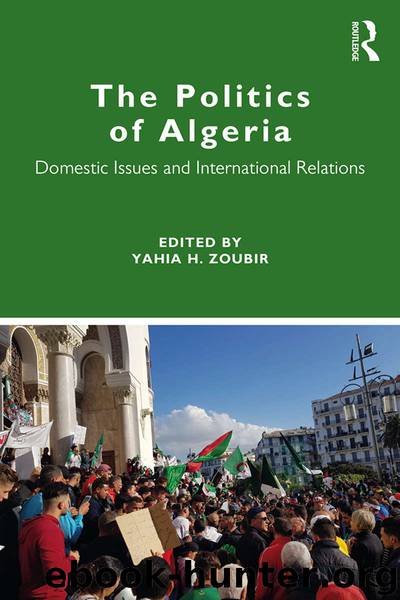The Politics of Algeria by Unknown

Author:Unknown
Language: eng
Format: epub
Publisher: Taylor and Francis
Published: 2019-11-13T16:00:00+00:00
Human rights on the screen: the role of private TV channels
Until the mid-1980s, broadcasting space was dominated by public TV channels that offer a content reflecting the dominant ideology. French satellite channels (TF1, A2, M, Canal +, etc.) made their appearance into Algerian households, offering new content, but most importantly a perspective on French and Western culture in general. During the 1990s, when terrorism was at its peak, French and Arab channels competed with Algerian national TV as a provider of national and international news. The restriction on information related to the security situation prevented Algerian viewers from becoming informed about the ongoing situation, not only for news, but even for entertainment as there was no competition in Algeria during that period (Sarnelli & Kobibi 2017: 6).
The situation remained unchanged until 2011, when private TV channels made their appearance, offering Algerian viewers new content both in terms of news and entertainment. The Algerian authorities had never intended to open the broadcasting sector to private capital for fear that opening that sector would allow more freedom to civil society and hence lessen government control. It could hardly be otherwise given Abdelaziz Bouteflika’s perception of the role of the press. This breach into the broadcasting landscape would not have happened without the Arab revolts that swept across some neighbouring countries.
The de-monopolisation of the broadcasting sector was strengthened with the release of a new law in March 2014, followed by terms of reference (in August 2016) that contain some guidelines explaining the rights and red lines that should not be crossed by private channels. Those two documents state that owners of TV or radio channels should not have links to any political party and the content broadcast should deal with specific topics and not encompass all issues (Art. 5) (JORADP 2014). Other restrictions were enacted, but the most restrictive one remains the person of the president. Indeed, as stated in terms of specifications (terms of reference) of August 2016, TV and radio channels should avoid offense, defamatory writing, or outrageous discourse against the president (Art. 7) (JORADP 2016).
In order to regulate this sector and organise the process of creating private channels, the new legal framework institutes a regulatory authority, an independent body with the mission to oversee the process of granting licenses and supervising content.
The audiovisual landscape is currently dominated by more than 40 private channels, but only five have a one-year authorisation to operate: Ennahar TV, Echourouk TV, Dzair TV, Dzair News, El Djazairia, Samira TV (cooking), and El Hogar.
While public TV channels refuse to tackle issues concerning human rights abuses, the new private TV stations broke the taboo by broadcasting some sensitive topics like social injustice, inequality between men and women, and the role of the army and security services in political life. Whether reported in the news or debated during television programmes by experts, political and social actors, the discourse adopted concerning human right issues is characterised by boldness. An illustration of the change in media discourse regarding this issue is HounaEl Djazair (This Is Algeria) in Echourouk TV, presented by Kada Ben Amar.
Download
This site does not store any files on its server. We only index and link to content provided by other sites. Please contact the content providers to delete copyright contents if any and email us, we'll remove relevant links or contents immediately.
Shoot Sexy by Ryan Armbrust(17149)
Portrait Mastery in Black & White: Learn the Signature Style of a Legendary Photographer by Tim Kelly(16491)
Adobe Camera Raw For Digital Photographers Only by Rob Sheppard(16394)
Photographically Speaking: A Deeper Look at Creating Stronger Images (Eva Spring's Library) by David duChemin(16163)
Bombshells: Glamour Girls of a Lifetime by Sullivan Steve(13117)
Art Nude Photography Explained: How to Photograph and Understand Great Art Nude Images by Simon Walden(12352)
Perfect Rhythm by Jae(4628)
Pillow Thoughts by Courtney Peppernell(3410)
The Book of Joy by Dalai Lama(3231)
Good by S. Walden(2919)
The Pixar Touch by David A. Price(2744)
Fantastic Beasts: The Crimes of Grindelwald by J. K. Rowling(2549)
A Dictionary of Sociology by Unknown(2521)
Humans of New York by Brandon Stanton(2382)
Read This If You Want to Take Great Photographs by Carroll Henry(2306)
Stacked Decks by The Rotenberg Collection(2280)
On Photography by Susan Sontag(2136)
Photographic Guide to the Birds of Indonesia by Strange Morten;(2091)
Insomniac City by Bill Hayes(2087)
